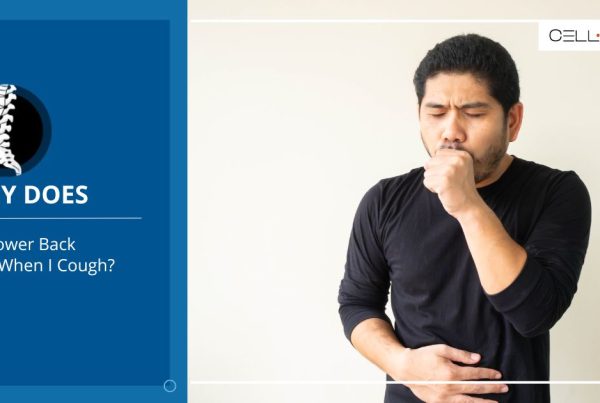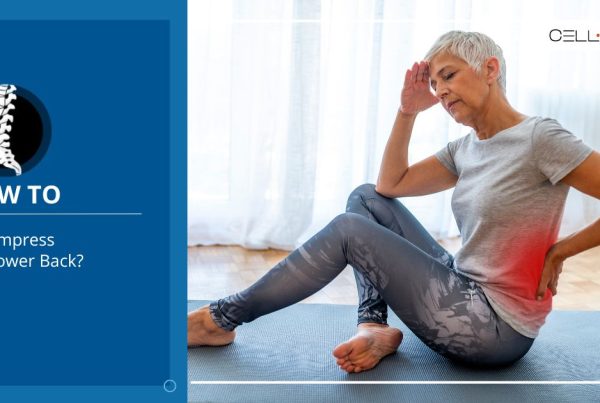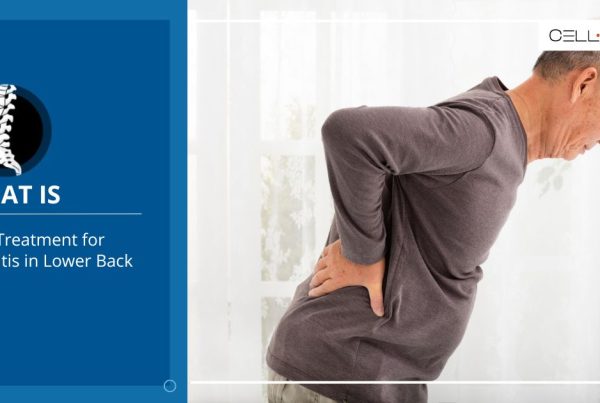Published on: November 6, 2024 | Updated on: January 18, 2025
According to experts, a whopping 60% of the adult population experiences lower back pain at some point in their lives.
Lower back pain can result from muscular spasms, exertion, strain, or other common reasons. This leaves us wondering how to loosen tight lower back muscles.
If you want to relieve pain and reduce inflammation in your back by loosening the tight muscles in your lower back, let’s examine effective strategies.
If you address this issue early on, it can save you quite a lot of trouble in preventing chronic back pain or injury!
Why Do Lower Back Muscles Tighten?
Our lower back region, also called the lumbar region, has many complex structures that are vital for proper functioning.
As our back supports the body’s entire weight, it has numerous vessels, nerves, bones, ligaments, and tendons that stabilize the back.
Any injury or trauma to the structures in our lower back causes immense pain. You may feel tightness in your lower back muscles for the following reasons.
Poor Posture
Slouching is bad for your back. We have heard this phrase numerous times, but we fail to understand that slouching puts pressure on the muscles of the lower back. This pressure tightens the tendons and ligaments of the back.
An Inactive Lifestyle
An inactive, sedentary lifestyle is our back’s biggest enemy. Inactivity makes our body maintain posture in unnatural positions. This puts a strain on the muscles of the lower back, causing muscle fatigue and tightness in the area.
Improper Lifting Techniques
Improperly lifting heavy objects in the wrong form strains our lower back, which tries to maintain the body’s center of balance. When this happens, the muscles in the back become strained, leading to muscle tension or tightness.
Sprains or Strains
Activities requiring engagement and repeated movements, like powerlifting or certain sports, can lead to tightness without a proper warm-up.
Effective Stretches for Loosening Lower Back Muscles
Nothing works better to relieve tensions in the lower back than stretches that target the lower back and provide instant relief.
Child’s Pose
The child’s pose is one of the most gentle yoga poses. It stretches out the lower back and relaxes the muscles.
Begin by being on your hands and knees, then sit back on your heels while stretching your arms forward. Hold this position for 30 seconds to 1 minute.
Cat-Cow Stretch
Cat-cow stretches are dynamic, as they loosen the spine and release tension in the lower back. They also serve as an excellent start to the day. Get on all fours and alternate between arcing and rounding your back while moving in sync with your breath.
Glute Bridge
According to a 2019 review, researchers have linked weak glutes (muscles that make up the buttocks) to a cause of lower back stiffness and aches. The glute bridge motion works a person’s gluteus maximus exactly when a person stands out of the squat.
For a glute bridge, you should be flat on the ground. Place both palms flat on the floor and knees shoulder-width apart. Then, slowly lift the pelvis off the floor without straining your back.
Form a straight line through the shoulder, hip, and knee. You should aim to hold this position for at least two seconds. Repeat about ten to twelve times.
While stretching is essential, strengthening the muscles of the lower back and core can aid in preventing tightness in the future. For this, strengthening exercises can help prevent tightness.
Strengthening Exercises to Prevent Muscle Tightness
If you’re wondering how to loosen tight lower back muscles, a few exercises will help.
Pelvic Tilts
Lie down on your back on the floor. Bend your knees, keeping your feet flat on the floor. Then, slowly tilt your pelvis towards the ceiling, engaging the core muscles.
You should be able to feel the tightness in your core. Like glute bridge, this daily exercise helps build the lower back muscles and improves stability.
Bird-Dog Exercise
Extend one arm and the opposite leg simultaneously on all fours. Suitable for people of all ages, it not only reliefs stress on the lower back but also helps in proper posture, better core engagement
Self-Massage Techniques
No longer do you need to go to the masseuse to get a good massage. You can now self-massage using tools such as foam rollers or a tennis ball at home.
Foam Rolling
How to loosen tight lower back muscles with foam rolling? Slowly roll the foam roller on the lower back muscles.
Focus on the areas where you feel the muscular tension. Don’t apply too much pressure on your spine; it will worsen the pain.
Tennis Ball Massage
You can also use a tennis ball to give yourself a back massage. Use a tennis ball to target the back muscles, especially the trigger points that ache daily.
Since a tennis ball is small, it massages the target knots precisely. You can also place the ball under your lower back and roll it around, applying pressure to areas of discomfort.
Massage Gun
A massage gun is an excellent tool for relieving muscle tightness. Put the massage gun on low-frequency settings before using it on your lower back. You should avoid direct contact with your spine.
Lifestyle Adjustments
Exercise helps keep the muscles active; however, to prevent the lower back muscles from getting tight again, subtle lifestyle changes are necessary for prolonged relief.
Medications such as steroids or long-term use of NSAIDs (non-steroidal anti-inflammatory drugs) can be damaging for both kidneys and the gut.
Eat Your Colors
One of the major contributors to such chronic pain lies embedded in the processed diet that does not prioritize a balanced meal.
Eating a nutrient-rich meal is essential to keeping the body healthy and in good shape. For this purpose, changes like shifting from simple carbohydrates to complex carbohydrates or prioritizing white meat instead of red meat become necessary.
Similarly, healthy fats such as olive oil, nuts, and seeds offer a healthier substitute for consuming food rich in traditional fat.
Take Regular Breaks
To hack the question of how to loosen a tight lower back, remember that bodily activity is the key. If you have a sedentary job, take regular breaks to stand, stretch, and move around. Prolonged sitting tightens muscles, especially in the lower back area.
Reduce Stress and Increase Sleep
Not only does stress affect your sleep, but it also affects your body and may sometimes be stored inside the muscles.
One can easily avoid stress and get a good night’s sleep via methods like cognitive behavioral therapy and meditation.
Coupled with stress management, maintaining a good sleep cycle becomes crucial. Going to bed and waking up at the same time keeps your internal clock in check and, hence, your body relaxed.
When to Seek Professional Help
While the aforementioned self-care techniques often help resolve minor muscle tightness, there are times when professional help is necessary,
If the pain persists or you experience tingling in your lower back and legs, seek help immediately. These could be indicative of more severe conditions, such as a herniated disc.
Sources
Footnotes
- Sai Kripa, Kaur H. Identifying relations between posture and pain in lower back pain patients: a narrative review. Bull Fac Phys Ther. 2021;26:34.
- Gordon R, Bloxham S. A systematic review of the effects of exercise and physical activity on non-specific chronic low back pain. Healthcare (Basel). 2016 Apr 25;4(2):22.
- Vinstrup J, Jakobsen MD, Andersen LL. Poor sleep is a risk factor for low-back pain among healthcare workers: prospective cohort study. Int J Environ Res Public Health. 2020 Feb;17(3):996.
References
- Lumbar Spine. Cleveland Clinic. Accessed 05/09/2024
- Everything You Want to Know About Lower Back Pain. Healthline. Accessed 05/09/2024.
- Stretching and strengthening exercises to relieve and prevent lower back pain. Harvard Health Publishing. Accessed 05/09/2024.
- 13 Top Exercises for Lower Back Pain. Benchmark Physiotherapy. Accessed 05/09/2024.
- How to Strengthen the Lower Back. Medical News Today. Accessed 05/09/2024.
- Lifestyle Changes to Ease Back Pain. Cleveland Clinic. Accessed 05/09/2024.
CELLAXYS does not offer Stem Cell Therapy as a cure for any medical condition. No statements or treatments presented by Cellaxys have been evaluated or approved by the Food and Drug Administration (FDA). This site contains no medical advice. All statements and opinions are provided for educational and informational purposes only.
Dr Pejman Bady
Author
Dr. Pejman Bady began his career over 20 years ago in Family/Emergency Medicine, working in fast-paced emergency departments in Nevada and Kansas. He has served the people of Las Vegas as a physician for over two decades. Throughout this time, he has been met with much acclaim and is now the head of Emergency Medical Services in Nye County, Nevada. More about the doctor on this page.
Dr Pouya Mohajer
Contributor
Pouya Mohajer, M.D. is the Director of Spine and Interventional Medicine for CELLAXYS: Age, Regenerative, and Interventional Medicine Centers. He has over 20 years of experience in pain management, perioperative medicine, and anesthesiology. Dr. Mohajer founded and is the Medical Director of Southern Nevada Pain Specialists and PRIMMED Clinics. He has dedicated his career to surgical innovation and scientific advancement. More about the doctor on this page.









